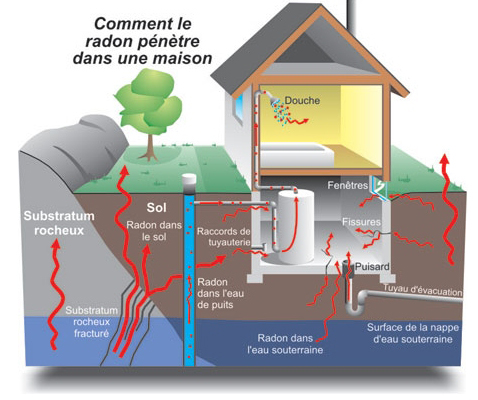Radon
What is radon?
Radon is a radioactive gas that forms from uranium present naturally in Earth’s crust. Radon is found in soil, everywhere on Earth’s surface. Levels of radon in the soil can vary greatly from one place to another. Radon can also be present in groundwater.
Radon can seep into buildings, particularly through foundations. It can sometimes accumulate and reach levels that can lead to health risks. Given it is a gas with no smell, taste or colour, it is impossible to detect with the senses.
What are the health effects of radon?
Radon is the second leading cause of lung cancer, after smoking. It is also the leading cause of cancer in non-smokers. In Québec, 10 to 16% of lung cancer deaths are attributed to radon. This represents 1000 deaths each year.
Source : https://www.quebec.ca/en/homes-and-housing/healthy-living-environment/residential-radon

Source : Natural Resources Canada
How do I test my home for radon?
To know the concentration of radon in your house, you must use a measuring instrument called a dosimeter. It is advisable to conduct that measurement over a period of at least three months and to perform radon measurement during winter. You can measure radon concentration in your house by yourself or hire a professional.
Do not rely on test results from a neighbouring house or dwellings in your neighbourhood. Radon concentration may vary widely between houses, even if they are close to each other.
You can get a dosimeter the following ways:
- Take Action on Radon is a national initiative funded by Health Canada and provides links of where to purchase test kits;
- CAA-Québec provides information on the various dosimeters and detectors available;
- The Québec chapter of The Lung Association’s website offers certified dosimeters approved by Health Canada.
To obtain a list of professionals certified to measure radon in Québec that are recognised by Health Canada and the Ministère de la Santé et des Services sociaux du Québec, consult the Canadian National Radon Proficiency Program (C-NRPP) website.
Where can I learn more?





